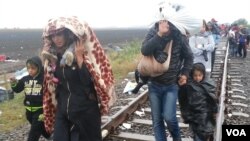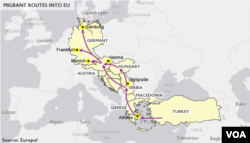The United States said Thursday it will accept at least 10,000 Syrian refugees in the coming year and increase its humanitarian assistance for those fleeing the violence in Syria.
White House spokesman Josh Earnest said President Barack Obama has directed officials to make preparations to let the refugees enter the country, starting next month.
Earnest said the new effort reflects a "significant scaling up." The U.S. accepts 70,000 refugees annually from around the world.
He said background checks on the new arrivals will be "robust" to ensure U.S. national security is not endangered. U.S. intelligence chief James Clapper said this week that he feared that Islamic State insurgents might infiltrate the refugees escaping conflict in the Mideast as they head to other countries.
The White House announcement came as thousands of refugees streamed through Europe, facing torrential rains on the Macedonian border with Greece, even as farther to the north Austria halted train service with Hungary because of "massive overcrowding."
Contradictions
Europe's chaotic response to the continent's biggest migrant crisis since World War II was on display with contradictory messages.
The European Parliament, in a non-binding vote, overwhelmingly supported the call by European Commission chief Jean-Claude Juncker for country-by-country mandatory quotas to accept 160,000 refugees, mostly from war-torn Syria, over the next two years.
But Romania became the latest Central European country to reject the quota plan, saying there was "no way" it would agree to take in as many asylum-seekers as Juncker wants.
Slovakia also opposes the plan, while Hungary said it expects to complete a fence by early October that it is building along its 175-kilometer Serbian border to keep more refugees from entering.
Both Austria and Hungary said record numbers of migrants had crossed their respective borders overnight into Thursday. Budapest said more than 3,000 people crossed into Hungary from Serbia, while Austria said a similar number entered its territory from Hungary.
Austria's train operator suspended train service with Hungary because of the crowded platforms and pleaded with bus companies and volunteers to stop bringing more refugees to the train stations.
Germany
German Vice Chancellor Sigmar Gabriel told parliament that about 450,000 refugees have already have arrived in Germany this year, with 37,000 of them just in the first eight days of September.
"Honestly speaking, this shows that the distribution of 160,000 refugees across Europe is a first step, if one wants to be polite," Gabriel said of the quota plan. "Or you could call it a drop in the ocean."
Chancellor Angela Merkel was cheered as she visited a Berlin refugee center, posing for selfie photos with new arrivals. They called her "Mama Merkel."
Laith Majid, an Iraqi refugee who reached Berlin with his wife and four children, said, "People know the meaning of love. We came out from death and I thank Allah for the life we are in now."
Seeking asylum
In the eastern Austrian town of Nickelsdorf, thousands gathered to await trains to Vienna and onward from there to Germany and elsewhere.
Austrian authorities are considering whether to send special trains to the border to transport the refugees to the Austrian capital.
Thousands of refugees have been flocking to Austria since it announced last week that it will accept asylum applications, as did Germany earlier in the week.
Europe is seeing its strongest influx of refugees in 70 years, as people seek to escape violence in Syria, Afghanistan, Iraq, and elsewhere in the Middle East and north Africa.
WATCH: Volunteers help migrants at Keleti station in Budapest, Hungary








